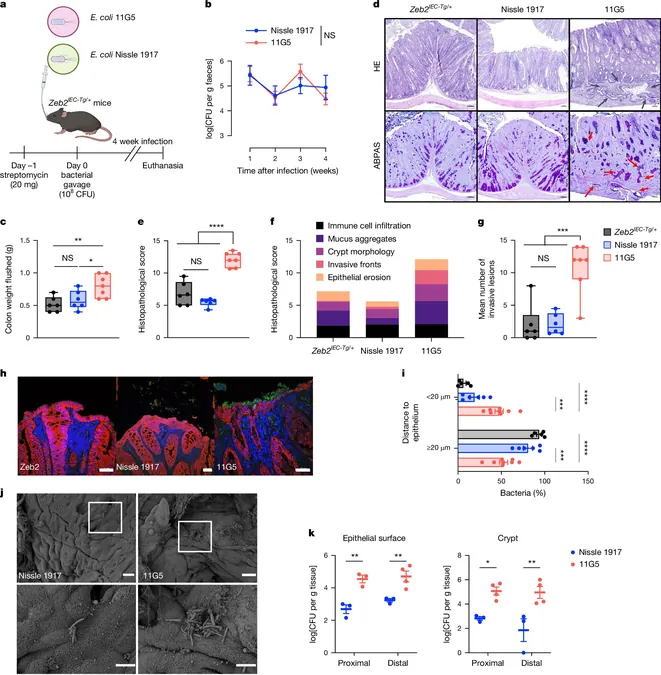
Breakthrough Discovery: How Specific E. Coli Bacteria Fuel Colon Cancer Risk!
2024-11-06
Author: Sarah
Introduction
In a groundbreaking study published in the prestigious journal Nature, a team of scientists has unveiled how certain strains of E. coli bacteria lurking in our guts can promote colon cancer. This alarming revelation could revolutionize strategies aimed at lowering cancer risk.
Colon Cancer and the Gut Microbiome
Colon cancer is currently the third most common and deadly cancer worldwide, and its prevalence is sharply rising, particularly among younger demographics. Recent research has illuminated a disturbing link between the gut microbiome—essentially the ecosystem of bacteria residing in our intestines—and the development of colon cancer, although the mechanisms behind this connection have remained poorly understood until now.
The Role of pks+ E. coli
The main culprit identified in this study is a type of E. coli known as pks+ E. coli, notorious for producing a potent genotoxin named "colibactin." This sinister toxin has the ability to bind to and damage human DNA, inciting mutations that heighten cancer risk. Notably, high levels of these bacteria and the mutations they cause have been observed in patients diagnosed with colon cancer.
Mechanism of Action
Researchers have been stumped about how pks+ E. coli makes its way to and damages the gut lining, which is critical for cancer progression. In a series of meticulous experiments, led by Prof. Lars Vereecke from the VIB-UGent Center for Inflammation Research and Prof. Han Remaut from the VIB-VUB Center for Structural Biology, the teams revealed that these bacteria can alternate between a freely floating state and an attached state, where they adhere to the intestinal epithelium. This process involves specialized structures called pili—slender protein fibers on the surface of the bacteria—that end in adhesins, which bind to specific receptors on intestinal cells.
Consequences of Bacterial Attachment
Maude Jans, the first author of the study, confirms, "This pilus binding not only increases the quantity and size of colon tumors but also their aggressiveness." Furthermore, Prof. Vereecke states, "Our research indicates that the attachment of pks+ E. coli to intestinal cells is a pivotal step toward colon cancer development. If we can interrupt this adhesion process, we could significantly hinder tumor growth."
Identification of Key Adhesins
The team painstakingly identified the key bacterial adhesins involved in this binding process: FimH and FmlH. Dr. Magdalena Kolata, a co-first author, explains, "We posited that these adhesins facilitate the production of colibactin close to epithelial cells, leading to DNA damage and cancer development." The results were compelling; removing these adhesins completely blocked the ability of the bacteria to produce colibactin, subsequently preventing DNA damage.
Potential Therapeutic Approaches
What's particularly exciting is the team's exploration of a new therapeutic approach designed to thwart this bacterial attachment using molecules that impede the binding of these crucial adhesins. "Our preliminary tests showed that we could effectively reduce DNA damage and tumor formation in preclinical models," remarked Jans. This promising treatment strategy focuses on targeting harmful E. coli strains without disrupting the balance of beneficial gut bacteria, a significant advantage over traditional antibiotics.
Impact of Lifestyle Factors
Additionally, researchers emphasize that lifestyle factors typical in Western societies may render our intestinal walls more susceptible to pathogenic bacteria like pks+ E. coli.
The Probiotic Puzzle
The study also brings to light a puzzling enigma in the microbiome field: certain E. coli strains certified for use as probiotics possess pks genes but do not increase cancer risk in laboratory settings. "We found that these probiotic strains do produce colibactin and possess the FimH and FmlH adhesins. However, they carry a variant of FimH that is less effective at binding, which prevents the toxin from reaching its target," notes Prof. Remaut. The implication here is profound: just a few genetic mutations could switch these strains from benign to potentially dangerous, prompting a reevaluation of their status as safe probiotics.
Conclusion
As we venture forward in understanding the complex interplay between our gut microbiome and health, these revelations underline the urgent need for deeper research into how bacteria can both protect and threaten our well-being. Stay tuned as scientists continue to unravel this intricate web, armed with new strategies to combat colon cancer risk!



 Brasil (PT)
Brasil (PT)
 Canada (EN)
Canada (EN)
 Chile (ES)
Chile (ES)
 España (ES)
España (ES)
 France (FR)
France (FR)
 Hong Kong (EN)
Hong Kong (EN)
 Italia (IT)
Italia (IT)
 日本 (JA)
日本 (JA)
 Magyarország (HU)
Magyarország (HU)
 Norge (NO)
Norge (NO)
 Polska (PL)
Polska (PL)
 Schweiz (DE)
Schweiz (DE)
 Singapore (EN)
Singapore (EN)
 Sverige (SV)
Sverige (SV)
 Suomi (FI)
Suomi (FI)
 Türkiye (TR)
Türkiye (TR)